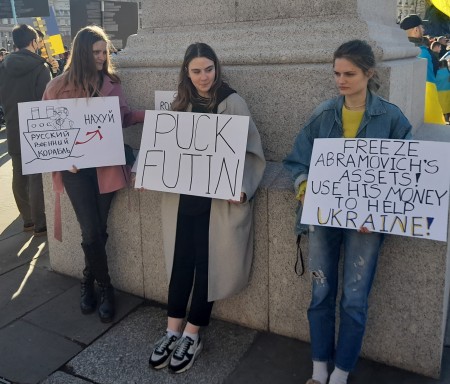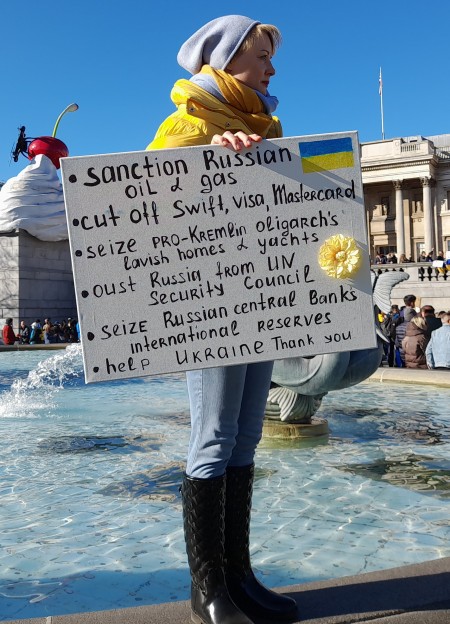 |
| Simon Pirani, 25-February-2022. |
Very broad sanctions are being imposed on Russia; Germany and the EU are rushing arms to Ukraine; and Belarus appears to be joining the attack on Ukraine. Nevertheless, the comments about Putinism may be of interest. SP.
Russia’s war in Ukraine will capsize its relations with Europe now, and for the long term. Its valuable trading partnership with Germany has been disrupted; by freezing certification for the Nord Stream 2 gas pipeline, Germany has opened a rift that could widen further.
Whatever the Kremlin’s war aims are – and at time of writing they are unclear – it has decided they are worth the sacrifice of Russian capital’s short-term economic interests.
 |
| Young Russians demonstrating in London on Sunday. The poster on the left quotes the Ukrainian sailors who told a Russian warship “fuck you” before being killed |
Nord Stream 2, a 1,200-kilometre pipeline running from north-west Russia under the Baltic Sea to Germany, alongside the existing Nord Stream 1 line, is completed, but will perhaps never be used. Both pipelines are owned and operated by Gazprom, Russia’s state-backed energy giant.
For years, German politicians defended the new pipeline in the face of calls from Ukraine to sanction it. Indeed, the chair of Nord Stream’s shareholder committee is the former German chancellor Gerhard Schroeder. In July last year, towards the end of Angela Merkel’s term as chancellor, Germany struck a deal with the US – which had previously imposed some sanctions on the project – that allowed it to go ahead.
But on Tuesday, within hours of Russian president Vladimir Putin recognising the separatist self-proclaimed ‘republics’ of Donetsk and Luhansk in eastern Ukraine, and approving open military support for them, the new German chancellor, Olaf Scholz, announced that his government had withdrawn an impact report on the pipeline, meaning that the German regulatory authority cannot approve it.
On Wednesday, Uniper, the German energy company that has invested in the project, expressed hope that it would be revived. Russia’s invasion of Ukraine on Thursday reduced its chances. Update: Yesterday (Sunday), BP announced that it would be seeking to sell its 20% stake in the flagship Russian oil company, Rosneft, which would bring to an end one of the biggest western investments in Russia.
Trade between Russia and Germany
Most of Germany’s own Russian gas imports are delivered via Nord Stream 1 and the Yamal line that crosses Belarus and Poland. Nord Stream 2’s main purpose was to take gas from Russia’s big new fields on the Yamal peninsula in Siberia across Germany towards Italy, Austria and other central and southern European countries. This would have helped to reduce Russian gas shipments across Ukraine, historically the largest transit corridor, to zero.
The freezing of the Nord Stream 2 approval process will not in itself stop any Russian gas from reaching European customers. But it will disrupt Gazprom’s plan to diversify gas transit away from Ukraine – and may start to unravel a trading relationship that started in Soviet times.
Siberian gas started flowing to Germany in the early 1980s, symbolising the Soviet leadership’s readiness to cooperate with the capitalist west, despite the opposition of the US and UK’s cold warriors.
In post-Soviet Russia, gas exports earned far less cash than oil sales, but remained crucial. During the 1990s recession and up until now, gas export revenues have subsidised cheap gas for Russian households and industry. Gas sales to Germany have helped a much larger trading and political relationship to flourish.
This past winter has strained that relationship. The European gas market found itself short of supply – due to several factors including the rapid post-pandemic economic revival and strong demand in Asia – and prices spiked. Gazprom, the number-one supplier of gas imports to Europe, aggravated the supply shortage by only serving customers with long-term contracts, and declining to offer extra volumes on the spot market.
This shortage has driven wholesale gas prices through the roof. In countries such as the UK – where neoliberal market dogma rules supreme, and there are no constraints on energy companies forcing the burden of price spikes on to retail customers – this has led to spiralling electricity bills.
In recent months, as tensions mounted over Russia’s pretensions in Ukraine, European politicians and the head of the International Energy Agency accused Gazprom of keeping Europe short of gas for political reasons. The company vehemently denied this – although Russian politicians hinted that hurrying up the Nord Stream 2 approval process, which began shortly after the US–German deal last July, could help to overcome problems.
But Gazprom’s claims that it had no gas to spare sounded hollow. It has broken no rules; it simply limited gas deliveries to those covered by contract. But in doing so, it appears to have damaged its own commercial interest – losing opportunities to make a quick killing at high prices – to conform with state diktats. This is not surprising. It is a state-controlled company and subject to Kremlin instruction.
Scholz’s eventual decision to junk Nord Stream 2 came as no surprise in Moscow. Senior German politicians had warned that Russian aggression towards Ukraine could lead to the project being reviewed. But the Kremlin decided to soak up more economic pain for the sake of its imperial adventure. This is the essence of Putinism: to compensate for economic weakness with armed thuggery.
Politics trumps economics
In 2000, Putin was anointed as president with the blood of Chechen civilians and Russian conscript soldiers. By crushing Chechnya’s national independence movement in the Second Chechen War, he restored the authority of the Russian state, which had been almost fatally eroded in the 1990s. (The western powers turned a blind eye.)
This opened the way for Russian capital’s most successful decade, the 2000s, when Putin struck a new deal with the billionaire oligarchs who controlled the oil, gas and metals industries. Oil prices soared; revenues from the export of raw materials rolled in.
But Russia’s hopes of imperial domination in the post-Soviet space and beyond were not realised. Economically, Central Asia slipped out of its control and into the Chinese sphere of influence. China now invests in Kazakhstan’s oil; gas from Turkmenistan, once Gazprom’s main foreign supplier, now goes to China. The Baltic states joined the European Union, and Ukraine also looked west.
In the aftermath of the world economic crash of 2009–10, Russia had to square its imperial ambitions with economic problems often associated with developing countries – above all, how to escape the ‘oil curse’ and shift the economy away from the export of raw materials towards manufacturing and technological progress.
 |
| Trafalgar Square, London, Sunday |
While the state continued its open and covert military actions in Ukraine and Syria, “the activity of Russian business abroad has sharply diminished”, according to economist Ilya Matveev. This shift was due, on the one hand, to the strategic orientation of the Kremlin with its emphasis on security and “hard power” and, on the other, to the “exhaustion of the country’s economic engine”.
Not only have many Russian companies been starved of finance, but Russia has lost Ukraine as a market. Ukraine’s main trading partner is now the EU, not Russia. Russia’s direct gas sales to Ukraine – long one of its top two export markets together with Germany – shuddered to a halt in 2016.
Scholz’s about-turn on Nord Stream 2 shows that Russia’s even more valuable economic relationship with Germany may also be undermined.
Will Germany decide to reduce its dependence on Russian gas imports over the long term? That will depend at least partly on the outcome of the war in Ukraine. At a minimum, that issue will be higher up the political agenda. Moreover, it comes at a time when the EU’s designation of gas as a ‘green’ fuel that can solve, rather than exacerbate, the climate crisis, is under fire from climate scientists and campaigners.
Right now, extremely high energy prices should make switching commercial investment into renewables easy. And all of us who hope for a better future could at this moment question the whole logic of fossil fuel-centred energy policies and supply systems. Perhaps there we may find some points of light in the darkness looming over Europe.
This article first appeared on Open Democracy
About the war






Abramovich (Gazprom) is giving the proceeds of the sale of Chelsea to the Ukrainian victims. I'm not entirely convinced the oligarchs are all on Putin's side with the war, and even his Generals look nonplussed.
ReplyDelete